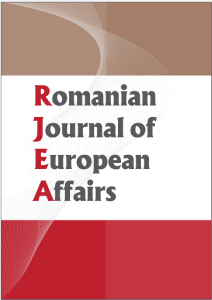Ediţia de primăvară a Romanian Journal of European Affairs aduce în atenţie subiecte privind: modelul instituţional al acordului de asociere UE-Ucraina, restricţiile de pe piaţa muncii şi migraţia către UE (cazul Ucrainei), Crimeea şi conflictul ruso-ucrainian, proiectul South Stream şi factorul Ucraina, contribuţia Curţii Europene de Conturi la răspunderea financiară europeană, precum şi o recenzie de carte pe tema genocidului din punct de vedere normativ.
Empowered to Deliver: The Institutional Model and Implementation Arrangements under the EU-Ukraine Association Agreement
Andriy Tyushka
Abstract:
In the context of truly politicised and geopolitically discoursed public and academic debates around the pioneering and, at the same time, revolutionary EU-Ukrainian association deal, this article seeks to present a pragmatic law and politics view on one of the cornerstone issues in the newly launched EU association policy towards Ukraine, i.e. the institutional and implementation framework. It therefore explores possible modalities and the actually arranged implementation model of the EU-Ukraine Association Agreement, and assesses the strengths and weaknesses thereof. The challenges posed by the recent unduly ‘flexibilisation’ and postponement of the agreement’s provisional application are analysed, and the procedural requirements for transitional implementation and full enactment are disclosed. Finally, the association’s institutional engineering is given thorough legal and political scrutiny, that allowed to contend that the truly empowered institutional framework and selected implementation model are deemed to gear the process of political association and economic integration, yet these heavily draw on explicit conferral of dynamic powers and implicit integration-oriented functional rationale.
Keywords: European Union, Ukraine, association agreement, application, implementation model, institutional framework
Labour Market Restrictions and Migrations in the EU: a Case of Ukrainian Migration
Tomáš Ducháč, Wadim Strielkowski, Anna Matušková
Abstract:
The thesis aims to estimate the future migration flows from Ukraine to the European Union. Based on the experience of previous EU enlargements and econometric modeling using the method of Ordinary Least Squares with fixed effects, multiple forecasts are created. The forecasts capture the likely development of migration flows in the event of abolishment of labour market restrictions as well as the case with pending restrictions. Our results show that migration flows are expected to be moderate, posing no threats to the stability of the labour markets of EU member states. The increase of migration due to accession to the EU is likely to be short-term, without substantial impacts in the long-run. Ukraine has large migration potential and is likely to supply the highest amount of labour migration amongst all former USSR countries.
Keywords: international migration, migration potential, ordinary least squares with fixed effects, migration forecasts
Crimea and the Russian-Ukrainian Conflict
Anton Bebler
Abstract:
The recent Russian-Ukrainian dispute over Crimea attracted wide international attention. The purpose of this paper is to explain its historic, demographic, legal, political and military strategic background, its similarities with and differences from other “frozen” conflicts on the periphery of the former Soviet Union, the roles of three main parties directly involved in the Crimean conflict, its linkage with secessionist attempts in Eastern and Southern Ukraine, wider international ramifications of the conflict and the ensuing deterioration of the West’s relations with the Russian Federation.
Keywords: Crimea, NATO, Russia, Ukraine, conflict, separatists, Moscow, Sevastopol, international relations
South Stream Project and the Ukrainian Factor
Roxana Ioana Banciu
Abstract:
The paper seeks to develop an analysis of the South Stream project in view of the Ukrainian crisis. We cannot put aside the internal factor as Ukraine is facing serious internal issues such as corruption and instability, therefore Russia’s invasion of Ukraine can not be simply ignored in this pipeline project. The article uses mostly facts that happened throughout last years, as well as for and against declarations in the case of the South Stream project and its mother Russia. When we hear about South Stream, we think of Russia and since 2007, this pipeline has encouraged Putin’s faith in energy superpower. A good point to start with was to gather all declarations since then and cover all actions that regard the South Stream game. In Russian foreign policy for the South Stream race, Soft Power was used more than enough and it has recently made room for Hard Power, which is the Ukraine never ending episode. Insights of the South Stream story have been lately related both softly and hardly, this is the reason why I have chosen to analyse both sides in order to complete the energy landscape.
Keywords: Ukraine, European Union, pipeline, South Stream, Gazprom, crisis
The Contribution of the European Court of Auditors to EU Financial Accountability in Times of Crisis
Maria-Luisa Sánchez Barrueco
Abstract:
Financial accountability, as the obligation of public institutions to explain the way in which they manage public funds before the citizens or their representing fora, is undoubtedly linked to systemic legitimacy in any political system, especially in times of economic harshness. Within the European Union, the institution embodying financial accountability is the European Court of Auditors (ECA). This paper represents a critical appraisal of the contribution of the ECA to restoring trust among European citizens. After recalling the theoretical link between financial accountability and legitimacy, a section highlights the particularities of financial management in a system of multilevel governance as the EU. The ECA’s institutional setup is then revised, in order to pinpoint potential gaps in its design that would reduce its effectiveness as the EU financial watchdog. Finally, attention is brought to the increased involvement of the ECA in solutions aimed at coping with the financial crisis. Recent developments show that the ECA is fully embarked in an institutional strategy to help cope with the financial and legitimacy crisis in the European Union.
Keywords: financial accountability, public management, systemic legitimacy, European Union
Book Review: Genocide: A Normative Account
Scott Nicholas Romaniuk
Abstract:
Academics studying genocide are required, amid the exigency of predicting and preventing further instances of this crime, to extend their efforts so as to connect with policy makers, provide vital information, respond to particular instances of genocide or state-inspired genocidal campaigns, and prompt a political will to intervene at any stage in this crime. May starts by placing genocide studies in the normative foundation of this discipline. In this work, which stands as the fourth volume of a broader project that assesses the “conceptual and normative underpinnings of this ‘crime of crimes’”, genocide is treated as the most serious of all international crimes. May calls for additional work to be performed to include other forms and conceptualizations of genocide such as cultural genocide and ethnic cleansing. The book outlines the fundamental concepts behind the crime, its study, and the discipline, while offering a unique presentation of “special problems of genocide”. It also considers steps that should be taken forward with the view of facilitating reconciliation. May refers to war as the final response to genocidal situations, not the first, stating that, “there are situations where there is not unambiguous groups of victims”. Thus, humanitarian intervention, as a viable approach to mitigating acts of genocide, is still difficult to justify.
Keywords: genocide, humanitarian intervention, Rwanda massacres






